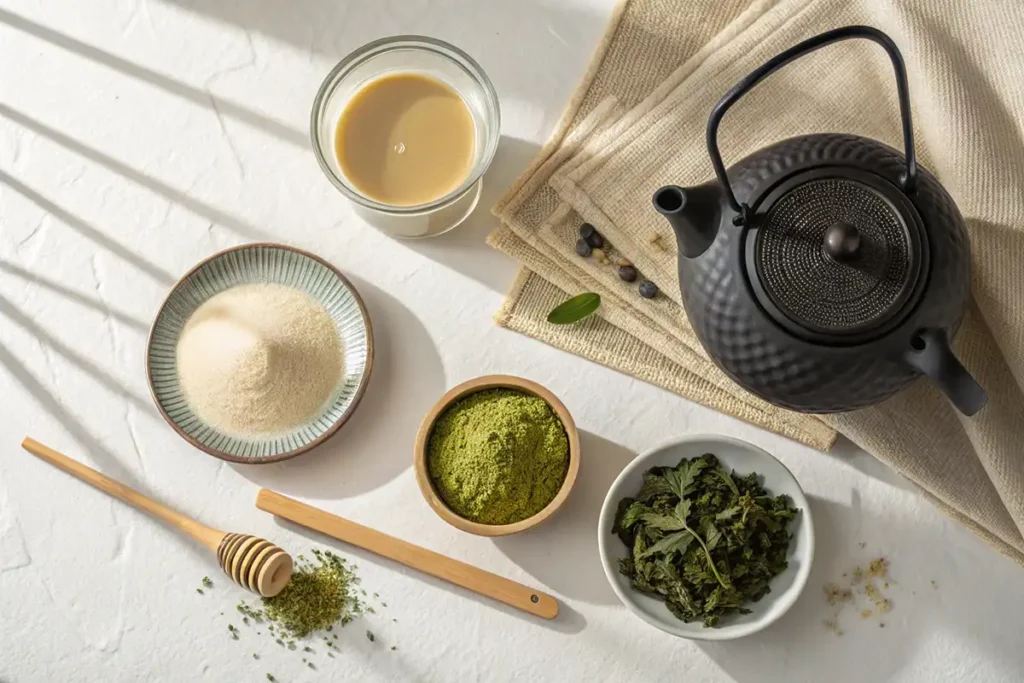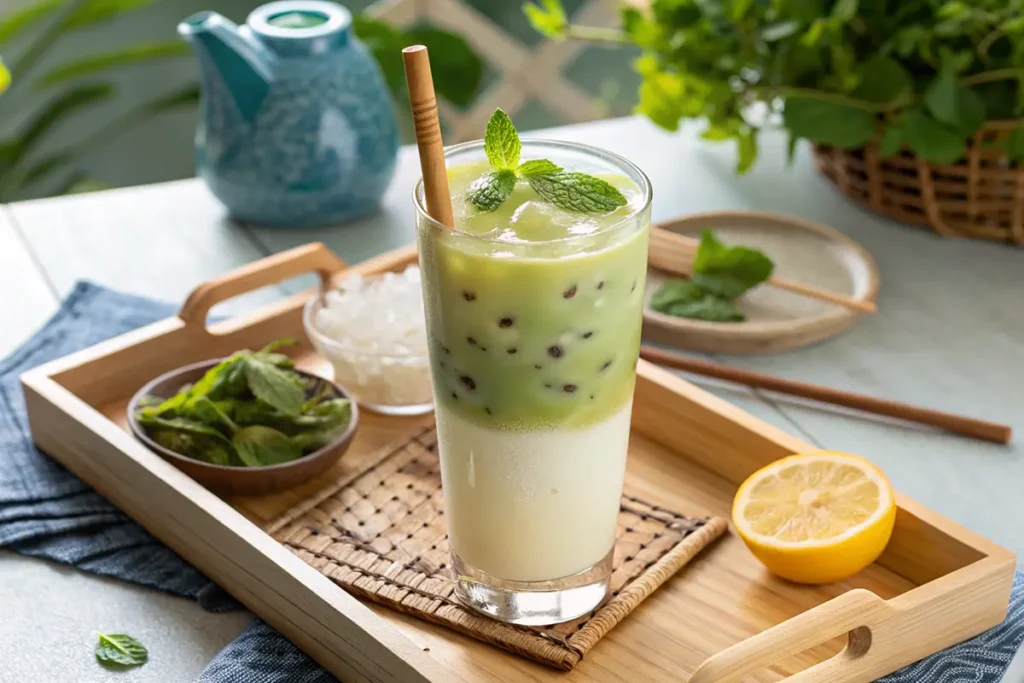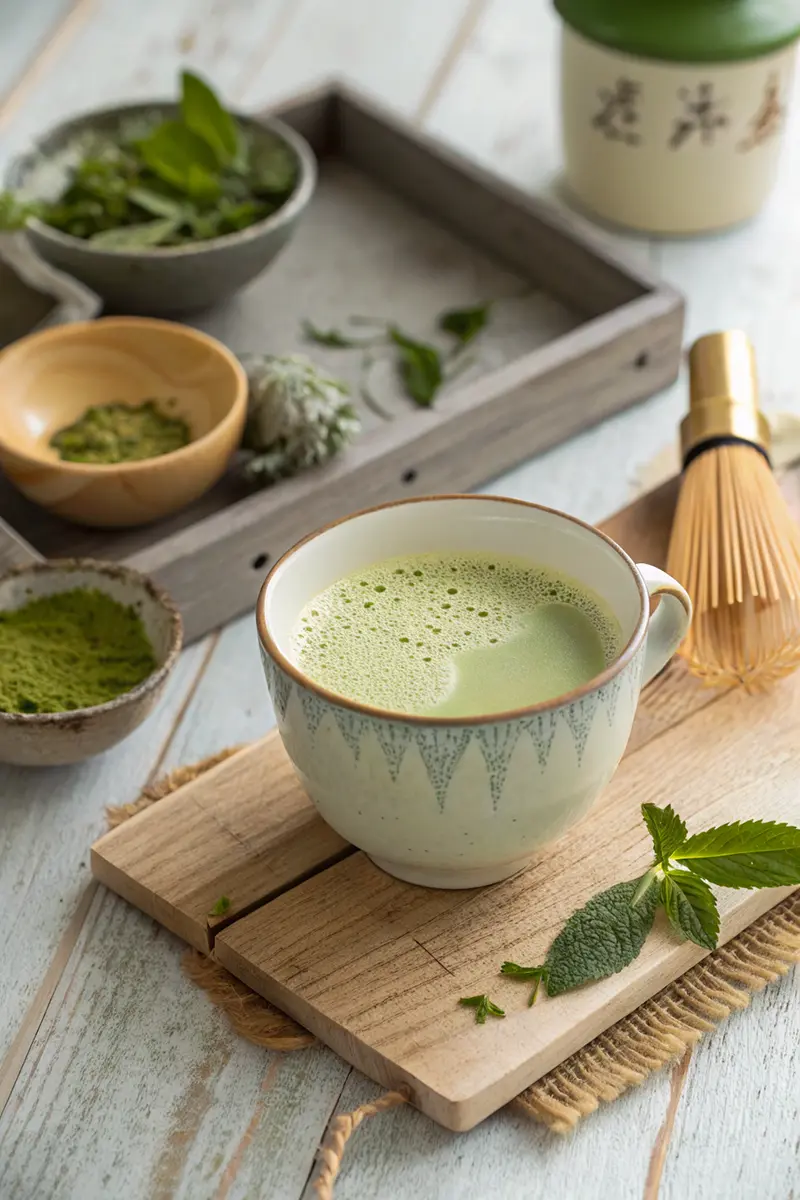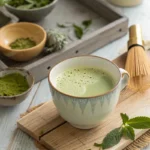Sencha Milk Tea isn’t your typical sweet and heavy boba-style drink — it’s something much more delicate, fresh, and quietly luxurious. I discovered it on a rainy morning in Kyoto, where a simple cup of tea at a family-run teahouse turned into a revelation. The grassy clarity of Sencha mingled with a splash of creamy oat milk, creating a drink that was light, clean, and unexpectedly comforting.
Unlike matcha’s bold umami or houjicha’s roasted depth, this green tea latte is a gentle breeze — just enough caffeine to wake you up, with a fresh green taste that feels like spring in a cup. If you’re someone who loves the idea of milk tea but often finds them too rich or too sweet, Sencha Milk Tea might be your perfect middle ground.
In this guide, I’ll walk you through what makes this Japanese classic so special, how to balance it beautifully with milk, and exactly how to make it at home — hot or iced. Ready to try something fresh, subtle, and soothing?
Table of Contents
Sencha Milk Tea: A Fresh & Creamy Green Tea Experience
Sencha Milk Tea is a fresh and subtle Japanese green tea latte made with lightly steamed green tea leaves, paired with creamy oat or almond milk for a soothing and refreshing drink.
- Prep Time: 5 minutes
- Cook Time: 2 minutes
- Total Time: 7 minutes
- Yield: 1 serving 1x
- Category: Drink
- Method: Stovetop
- Cuisine: Japanese
Ingredients
- 1 tsp loose leaf Sencha or 1.5 tsp Sencha powder
- ¾ cup filtered water
- ½ cup oat milk or almond/skim milk
- ½ tsp simple syrup or a drop of honey
- Optional: ice cubes (for iced version)
Instructions
- Heat water to 160–175°F (70–80°C). Do not boil.
- Steep Sencha for 30 seconds to 1 minute. Adjust time to taste. Strain if using loose leaves.
- Warm milk separately. Froth if desired.
- Combine steeped tea with warm milk. Stir in sweetener gently.
- For iced version: Brew and chill tea. In a glass, add ice, pour chilled tea, then milk. Stir lightly before serving.
Notes
Use oat or almond milk for best balance. Brew Sencha at low temperature to avoid bitterness and preserve delicate flavor.
Nutrition
- Serving Size: 1 cup
- Calories: 60
- Sugar: 5g
- Sodium: 40mg
- Fat: 2g
- Saturated Fat: 0.5g
- Unsaturated Fat: 1g
- Trans Fat: 0g
- Carbohydrates: 8g
- Fiber: 0g
- Protein: 1g
- Cholesterol: 0mg
Discovering Sencha: The Everyday Green Tea with Surprising Depth
What is Sencha? Japan’s Most Loved Green Tea
If you’ve ever had a cup of Japanese green tea at a sushi restaurant, there’s a good chance it was Sencha. It’s the most commonly consumed tea in Japan — and for good reason.
Sencha is made from whole green tea leaves that are steam-processed, unlike Chinese green teas that are typically pan-fired. That steam gives it its bright green color, delicate aroma, and grassy flavor. Its needle-like leaves unfurl into a clean, yellow-green infusion with flavors that range from vegetal to slightly oceanic, depending on quality.
Compared to Matcha Milk Tea, which is powdered and intense, or Houjicha Milk Tea, which is roasted and nutty, Sencha sits in a more refreshing space — light, slightly astringent, sometimes with a gentle umami undertone.
This makes it a fascinating candidate for milk tea: it’s not overpowering, but with the right approach, it can become something truly refreshing and elegant.
Sencha Tea Benefits: Calm Focus Meets Fresh Energy
Sencha isn’t just pleasant to sip — it’s also packed with natural benefits that make it a smart addition to your daily routine:
- Rich in EGCG Catechins: These powerful antioxidants fight free radicals and support healthy aging.
- L-Theanine & Caffeine Combo: This pairing gives you calm, focused energy without the crash. It’s like productivity in a cup.
- Moderate Caffeine: Enough to perk you up, but less than coffee or black tea.
- Vitamin C & Trace Minerals: Thanks to the minimal processing, Sencha retains nutrients often lost in other teas.
- Oral Health Perks: Like other green teas, it may help with breath freshness and dental health.
With all this in one cup, it’s easy to see why Japanese green tea is often tied to longevity and vitality.
Gentle Creaminess: Finding the Perfect Balance with Milk
The Best Milks for Sencha’s Delicate Profile
Here’s the truth: Sencha doesn’t love just any milk. Its light, slightly astringent nature means that if you pair it with something too rich, you’ll overpower it — or worse, curdle it.
After testing different milks, here’s what I recommend:
- Oat Milk (Barista Blend): My go-to. It’s creamy but neutral, doesn’t mask Sencha’s freshness, and it steams or froths beautifully.
- Almond Milk (Unsweetened): Its subtle nuttiness complements the earthy side of Sencha without overwhelming it.
- Skim or Low-Fat Dairy Milk: If you prefer dairy, lighter versions work best. Avoid full-fat creaminess that could drown the tea’s clean taste.
Want to experiment further with milk + green tea combos? You’ll love how we approached it in both Coconut Milk Green Tea and the Matcha Coconut Latte.
Sweeteners That Let the Tea Shine
Sencha has a quiet, natural sweetness — which means a little sweetener goes a long way. Here are my favorites:
- Simple syrup (just enough to round out bitterness)
- Honey, especially light floral varieties
- Agave, if you want something mellow and neutral
- Stevia or monk fruit, for sugar-free options that won’t dominate the flavor
The key here? Add sparingly. You want to enhance, not overpower.
Let’s Brew: How to Make Sencha Milk Tea (Hot & Iced)
The Hot Sencha Milk Tea Recipe
Here’s how I make it at home when I need a little mid-morning clarity.
You’ll need:
- 1 tsp loose leaf Sencha (or 1.5 tsp Sencha powder)
- ¾ cup filtered water
- ½ cup oat milk (or almond/skim milk)
- Sweetener of choice (½ tsp simple syrup or a drop of honey)

Steps:
- Heat your water to 160–175°F (70–80°C). Never boil — it will scorch the leaves and make the tea bitter.
- Steep your Sencha for just 30 seconds to 1 minute. Taste — you can go longer on the second steep if needed.
- Warm your milk separately and froth if desired.
- Combine tea and milk. Stir in sweetener.
- Sip slowly. Appreciate that grassy aroma rising through the steam.
Pro Tip: Pre-warm your cup to preserve flavor and temperature!
Iced Sencha Milk Tea Recipe
In summer, I love the crispness of iced Sencha milk tea. You have two brewing options:
- Cold Brew Method: Steep 1 tsp Sencha in cold water overnight for the smoothest, least bitter flavor.
- Hot Brew + Chill: Brew normally, then chill quickly before mixing with cold milk and ice.
Serve in a tall glass with ice and a mint sprig or lemon wheel. This drink is a total refresher.

Flavor & Aesthetic Enhancements
Want to elevate the experience? Try:
- A dusting of matcha or Sencha powder on top
- A splash of vanilla extract
- A squeeze of yuzu or lemon for brightness
- Light layering in iced versions: green tea on bottom, milk slowly poured over for a soft two-tone effect
Fresh Takes: Twists & Pairings That Celebrate Simplicity
Creative Sencha Milk Tea Variations
Sencha is surprisingly versatile! A few creative spins:
- Sencha Citrus Milk Tea: Add a hint of lemon or yuzu juice for zest.
- Sencha Coconut Milk Tea: A tropical twist with light coconut milk. (Inspired by our Coconut Milk Green Tea)
- Sencha Ginger Milk Tea: A thin slice of ginger adds cozy warmth.
- Sencha Boba Milk Tea: Less sweet than most boba drinks, but delightfully unique.
→ Curious about the calorie impact? Check out our Bubble Milk Tea Calories Guide.
What to Serve with Sencha Milk Tea
Because it’s not heavy, Sencha Milk Tea pairs beautifully with:
- Light Japanese pastries like mochi or yokan
- Fresh seasonal fruit
- Neutral crackers or shortbread
It’s a lovely choice for a minimalist tea break or a reset moment during your day.
FAQ – Quick Sips of Clarity
Is Sencha good with milk?
Yes, but with finesse. Sencha’s grassy and sometimes slightly astringent notes require a gentle touch. When paired with the right milk — like oat or almond — and brewed properly at lower temperatures, Sencha Milk Tea becomes a refreshing, creamy green tea experience that preserves the leaf’s natural vibrancy.
What is Camellia milk tea?
Camellia milk tea usually refers to tea made from the Camellia sinensis plant, which includes green, black, and oolong teas. It’s not a specific flavor but a category. So if you’re drinking Sencha Milk Tea, Matcha Milk Tea, or even a classic black milk tea, you’re enjoying a version of Camellia milk tea.
What does Sencha tea taste like?
Sencha has a bright, grassy flavor with hints of seaweed or steamed greens, depending on its origin. It’s often described as fresh, slightly astringent, and clean — sometimes with a soft umami edge. When paired with milk, it takes on a subtle creaminess while still retaining that characteristic Japanese green tea brightness.
Is green tea good for milk tea?
It can be — as long as you choose the right green tea and milk combination. Matcha is bold and creamy, Sencha is delicate and grassy, and Houjicha is roasted and smooth. All can work well in milk teas if brewed carefully and paired with light, complementary milks like oat or almond.
Conclusion: A Delicate Departure from the Ordinary
Sencha Milk Tea brings something rare to the world of milk teas — freshness, clarity, and balance. It’s grassy without being green, creamy without being heavy, and just sweet enough to soothe.
If you’ve only known milk tea as bold, sugary, and rich, this is your invitation to explore a lighter, cleaner path.
Whether you drink it hot on a foggy morning or iced on a sunny afternoon, Sencha Milk Tea is a quiet reminder that even the most delicate things can be deeply satisfying.
Try it once — and you might just fall for its quiet charm.


